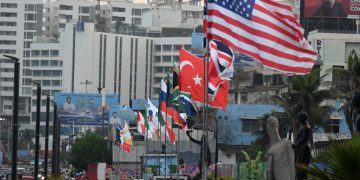New Delhi
As Apple looks beyond China to secure crucial supply chains strained by Covid lockdowns and threatened by rising geopolitical tension, India has emerged as an attractive potential alternative to the world’s second largest economy.
And Beijing’s big regional rival isn’t missing a beat in talking up the opportunity. One of India’s top ministers said last month the California-based company wants to ramp up its production in the South Asian country to a quarter of its overall total.
Minister of Commerce and Industry Piyush Goyal said Apple was already making between 5% and 7% of its products in India. “If I am not mistaken, they are targeting to go up to 25% of their manufacturing,” he said at an event in January.
His comments come at a time when Foxconn (HNHPF), a top Apple supplier, is looking to expand its operations in India after suffering severe supply disruptions in China.
For years, Apple had relied on a vast manufacturing network in China to mass produce iPhones, iPads and other popular products. But its dependence on the country was tested last year by Beijing’s strict zero-Covid strategy, which was rapidly dismantled last December.
Since the middle of last year, Apple has redoubled its efforts to invest in India. But can Asia’s third largest economy deliver?
“Theoretically, it can be done, but it won’t be happening overnight,” said Tarun Pathak, a research director at market research firm Counterpoint.
“[Apple’s] dependency on China is a result of almost two and a half decades of what China put in to develop their entire electronics manufacturing ecosystem,” Pathak said, adding that the company makes nearly 95% of its phones in China.
Apple did not respond to requests for comment from CNN.
China headaches mount
But the world’s most valuable company posted shockingly weak earnings this month, partly because of its recent problems in China. The troubles started in October, when workers began fleeing the world’s biggest iPhone factory, run by Foxconn, over a Covid outbreak.
Short on staff, Foxconn offered bonuses to workers to return. But violent protests broke out in November, when newly-hired staff said management had reneged on their promises. Workers clashed with security officers, before the company eventually offered them cash to quit and leave the site.
While operations at the sprawling campus in Zhengzhou, central China, have now returned to normal, the supply problems hit the supply of iPhone 14 Pro and iPhone 14 Pro Max models during the key holiday shopping season.
Foxconn did not respond to a request for comment.




















































